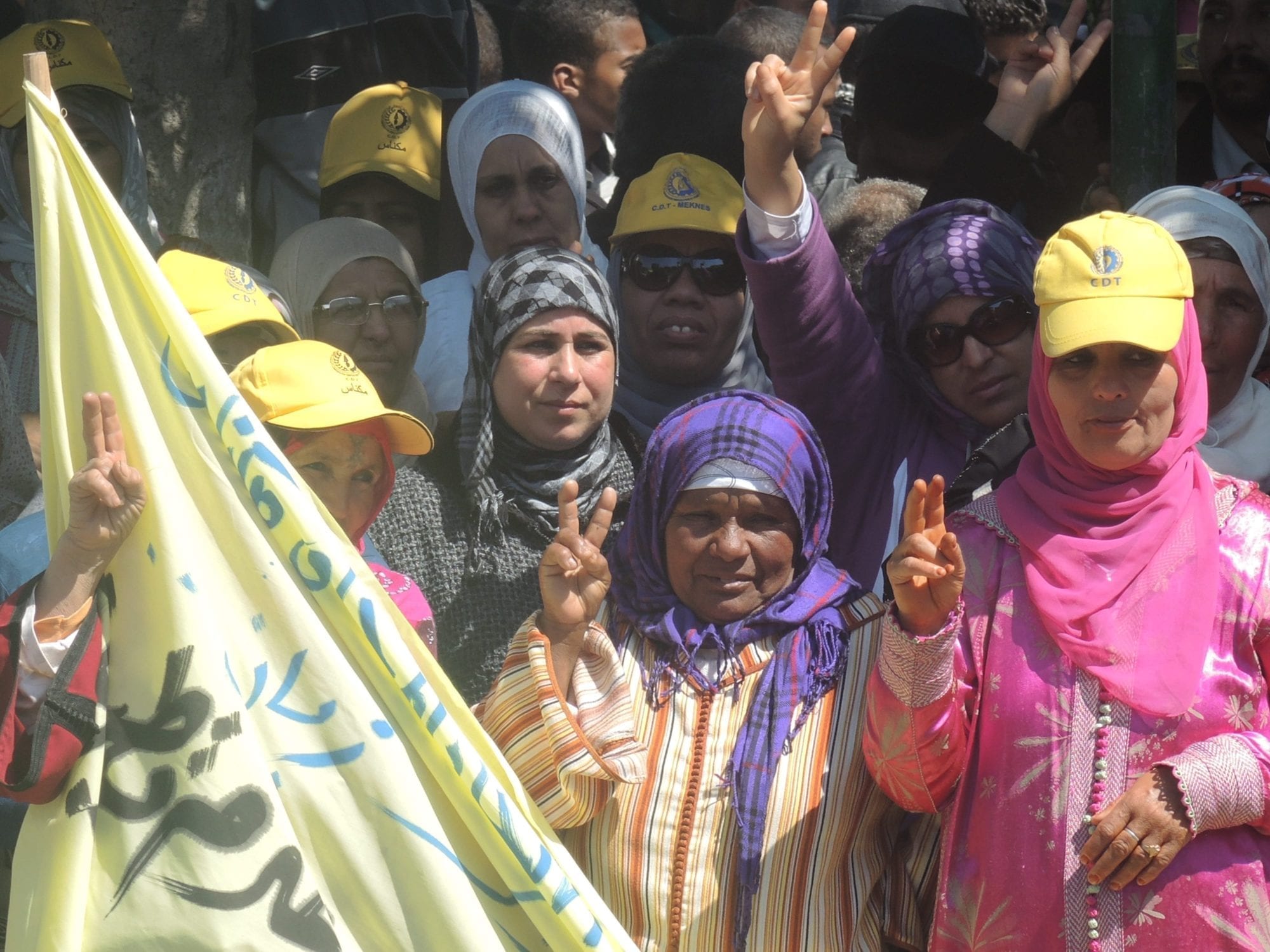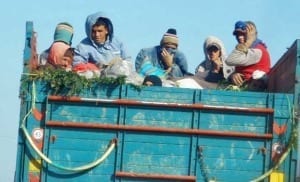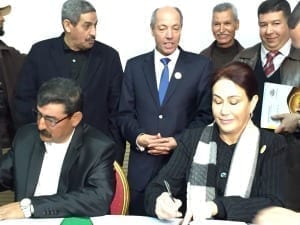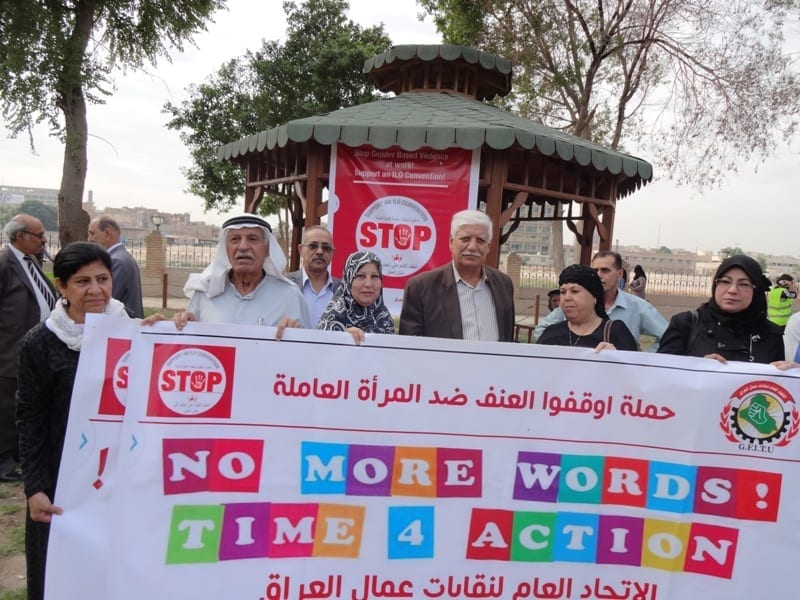
Jan 9, 2015

Agricultural workers in Meknes, Morocco, now have a first-ever collective bargaining agreement. Credit: Hind Cherrouk/Solidarity Center
The Confédération Démocratique du Travail (Democratic Labor Confederation, CDT) and the agro-industry employer, Les Domaines Brahim Zniber, signed a collective bargaining agreement today that covers nearly 1,000 agricultural workers on five large farms in Morocco’s fertile Meknes region. The pact follows a multi-year campaign by the CDT, with support from the Solidarity Center, to help workers in orchards, olive groves and vineyards improve their working conditions.
Under the agreement, agricultural workers receive bonuses if their work exceeds the norm. The agro-industry employer will provide safety equipment and social benefits, enabling workers to access worker compensation and other fundamental protections.

Moroccan Labor Minister Abdeslam Seddiki (standing, center), employer Rita Zniber and Bouchta Boukhalfa, the leader of CDT in Meknes (standing, left), take part in the signing ceremony. Credit: Colette Young/Solidarity Center
Crucially, this agreement– formalized during a ceremony with 400 workers, employers, labor leaders and government officials taking part–will guarantee their right to freedom of association and guarantees the rights of parties and social peace. In addition, this agreement will benefit all agricultural workers, especially women workers, who are active in this sector and represents an important percentage of the workforce. Les Domaines Brahim Zniber and the CDT are building bridges to extend similar agreements to other regions in Morocco.
“This agreement will ensure stability in employment,”says Abdelali Bouhiyadi, a union representative. “Even seasonal workers will keep their jobs and stay on the farms. Seasonal workers will be integrated gradually and the agreement will ensure social peace because a committee on conflict and negotiation will be established.”
Agriculture is a cornerstone of Morocco’s economy, with high-quality agricultural products, such as wine and olive oil, exported to Europe. Some 43 percent of workers in Morocco are employed in the country’s agriculture sector, and 40 percent are women.
“This agreement will allow us to have the opportunity to be trained in our jobs,” says Hayat El Khomssi, an agricultural worker.
The agreement is an important contribution to sustainable development and economic stability in Morocco, and will serve as a model for others to follow in Morocco and throughout the region. By taking this pioneering step and signing this agreement with the CDT, Les Domaines Brahim Zniber says it offers an example to other corporations that achieving world-quality products requires world-quality workers, and investing in workers is the most important investment corporations can make.
CDT leaders say this victory is an important step toward achieving the union’s vision of a sector-wide collective bargaining agreement for agricultural workers, one with the potential of improving the working conditions of all agricultural workers in Morocco.

Nov 25, 2014
Violence against women takes many forms, and can happen in the home, in public spaces—and on the job. At the workplace, 35 percent of women worldwide have experienced violence.
This November 25, International Day for the Elimination of Violence against Women, unions around the world are calling for the International Labor Organization (ILO) to pass an global convention on gender-based violence at the workplace. As the International Trade Union Confederation (ITUC) points out, “anyone can be a victim of violence at work, but gender-based violence typifies unequal economic and social power relations between women and men.”
Union leaders and allies are re-submitting a proposal to the ILO Governing Body requiring the ILO to develop an international standard to guide governments and businesses in formulating strong laws and policies to prevent and remedy gender-based violence at work. The ILO Governing Body adjourned this month without considering a similar proposal, and will meet again in March 2015. (You can take action through the International Transport Workers’ Federation’s “End workplace violence against women” campaign.)
This fall, workers in the Middle East and North Africa waged rallies and sit-ins to highlight the issue. The General Federation of Iraq Trade Unions (GFITU) organized a solidarity gathering in late October at Al Qushla Square in Baghdad. Hashmeyya Al Sa’adawi,IndustriALL executive board member and president of the electricity union in Basrah, read the statement of the Arab unionist women network, which expressed concern over increased violence against women.
“We believe that the violence against women issue is a crucial matter that requires immediate action,” she stated
In Morocco, the Democratic Labor Confederation (Confédération Démocratique du Travaille, CDT), organized a sit-in outside Parliament to raise awareness about gender-based violence in the workplace and request support for the convention (watch a video clip of the event).
The Jordanian Federation of the Independent Trade Unions sent a letter to the country’s chambers of commerce and industry and Jordanian government officials urging their support for passage of the gender-based violence standards in the ILO Administration Council.
Women disproportionately work in precarious, low-income and informal economy jobs, where there are few mechanisms to prevent violence and exploitation. Women also are the majority in occupations where workers are more likely to be exposed to violence, such as domestic work and health care, the garment and textile industries and in agriculture. Many women do not report physical, psychological or sexual violence fearing they will be fired or because of cultural norms.
An ILO Convention would further acknowledge that violence against women is a human rights violation, and would be an important step to improving women’s working conditions worldwide and saving the millions of dollars spent every year on health care, lower productivity and sick leave because of violence against women,
Oct 31, 2014

Workers from three union federations waged a general strike in Morocco. Credit: IndustriALL
Thousands of workers in Morocco’s three trade union federations waged a general strike Wednesday to protest the government’s refusal to discuss fundamental worker issues such as working conditions, pensions and other benefits.
manufacturing, commerce and agriculture, along with private-sector employees, took to the streets after many attempts to engage the government in collective bargaining.
The first-ever joint strike involving the Confédération Démocratique du Travail (CDT), the Union Marocain du Travail (UMT) and the Fédération Démocratique du Travail (FDT) highlighted worker frustration with the lack of dialogue. Workers also protested the government freezing salaries and benefits while raising taxes. The economic squeeze is exacerbated by the skyrocketing cost of consumer goods.
Workers also called out corporations for their selective application of Morocco’s labor code, saying many employers only abide by a few provisions and ignore key regulations such as those covering workplace health and safety and medical coverage.
The workers are demanding the government:
• Decrease taxes on wages and consumption,
• Retract the law that criminalizes union activity,
• Provide citizens with adequate public services,
• Guarantee secure and stable employment and cease hiring workers for precarious subcontracted or temporary jobs,
• End ongoing freedom of association violations, which include dismissing union leaders and firing large numbers of workers, and
• Address the concerns of retired workers struggling to survive on pensions.
Read the full list of demands in French and Arabic.
Sep 25, 2014

Said El Hairech, general secretary of the National Union of Port Workers, jailed for union activity in 2012 is now celebrating a new bargaining pact. Credit: ITF
Dock workers in Tangiers, Morocco, successfully negotiated a collective bargaining agreement yesterday after a two-year struggle for worker rights that involved the wrongful arrest of union leaders for union activity and an international campaign to free the two men.
Significantly, the new pact with the global port operator APM Terminals includes respect for trade union rights along with a commitment to social dialogue, according to Said El Hairech, general secretary of the National Union of Port Workers (Union des Syndicats des Transports), an affiliate of the Moroccan Labor Union (UMT) and of the International Transport Workers’ Federation (ITF). The agreement with APM, a global network that employs 20,300 employees in 67 countries with interests in 70 port and terminal facilities, also improves working conditions and paid time-off for trade union representatives.
“This CBA embodies what we want—dynamic economic and social objectives,” said El Hairech, who also is chairman of ITF’s Arab World Regional Conference.
In 2012, El Hairech and Mohamed Chamchati, general secretary of UMT’s Merchant Seafarers’ Union, were arrested and imprisoned before eventually being released in October and November after the ITF launched a global solidarity campaign in support of the two men. The Solidarity Center worked to raise awareness about the campaign along with the UMT, a longtime ally.
The cargo port of Tangier-Med is a flagship development project for Morocco that has attracted significant international investment, and El Hairech says the agreement makes it clear that “union and management are working towards a common goal here: ambitious economic expansion in the framework of a common perspective on social responsibility.”
May 29, 2014
Several workers in Tangiers, Morocco, were beaten as they protested the firing of union leaders at a packing factory in recent days. One worker lost four teeth and, along with one other man, required hospitalization. A video documents the aftermath of the attack, during which a worker lay bleeding on the ground.
After workers established a union affiliated with the Moroccan Labor Union (Union Maroccaine du Travail, UMT) at the industrial packaging plant in the Gaznaya free-trade zone in Tangiers, management fired the union leaders. Union leaders say they believe the men who attacked the protesters were hired by the employer. Workers say the poor working conditions at the manufacturing plant led them to form a union.
In February, five workers were fired from their jobs at a call center in Casablanca, Morocco, after they formed a union.






